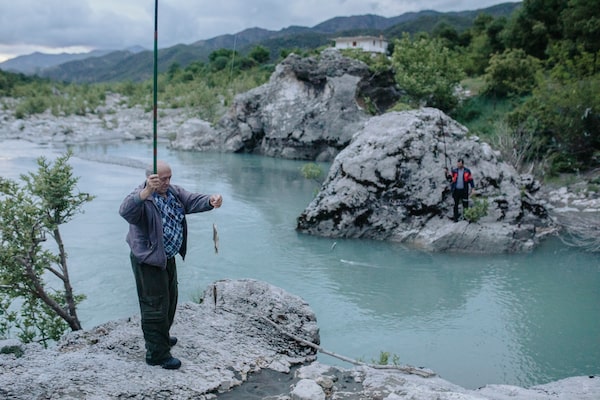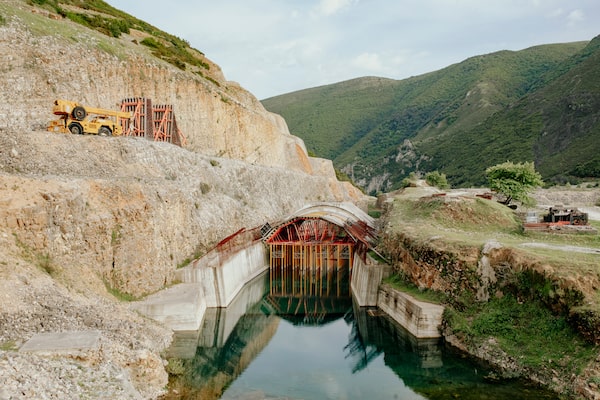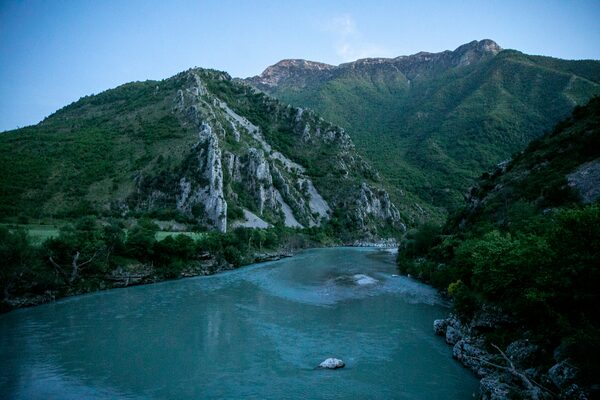If you’re reading this on the web or someone forwarded this e-mail newsletter to you, you can sign up for Globe Climate and all Globe newsletters here.
Good afternoon, and welcome to Globe Climate, a newsletter about climate change, environment and resources in Canada.
Across the country there’s still ... a lot of snow. And with the snow comes an annoying chore, but one shared by neighbours: shovelling. Instead of being irritated, one Canadian is finding solace in the habitual task. In fact, in this recent first-person submission, they even find it meditative.
“When I am shovelling I forget about my anxieties, what I desperately want out of life, the people I miss from my past, grief, worry, triumphs, lows,” writes Mormei Zank. “For 15 minutes of my day, I am just a person, clearing their driveway because it is winter in Canada.”
I hope you can find the same peace while dealing with the snow this week.
Now, let’s catch you up on other news.
Noteworthy reporting this week:
- Olympics: How an environmental ban on toxic ski waxes prompted an Olympic snow-sport arms race
- ESG: Why renewable energy stocks are tanking again, despite climate change fears
- Carbon Capture: Urgency needed on carbon capture tax credit, clean fuel standards, Shell Canada says
- Oil and gas: PBO’s report on orphaned oil wells omits some costs; Quebec Indigenous groups join Questerre Energy in push for natural gas development
- From The Narwhal: Canada’s biggest emitters are paying the lowest price on carbon
A deeper dive
The future of the Vjosa as a wild river remains uncertain
The Vjosa is one of the last natural wild rivers in Europe. But that claim is being threatened by 27 hydroelectric power plants that are proposed to be built along the Vjosa and its tributaries.
All in, 400 new hydroelectric power plants are being planned in Albania, and for the Vjosa that could forever change the ecosystem and life along the river.
Not only would this further affect the people who make their livelihoods such as those who live in small farming villages overlooking the valley, but also researchers who say they can look back in time and draw conclusions about how rivers used to be in Western Europe.

Giorgio (75), a retiree from Kaludh, a remote village close to the greek border, goes fishing every evening. As many in Kaludh he lives selfsufficient by growing vegetables and fishing in the river. Scientists fear that the cosntruction of dams along the river and its tributaries will effect the fish population.JONAS KAKO/The Globe and Mail
“Spending a few days with the young shepherds of Kute was an amazing experience.”
Jonas Kako visited Albania to photograph the river, and got a chance to meet the people who live there. He wrote about his experience for The Globe, and about the issues surrounding the protection of the Vjosa river.
“Although we were only speaking through Google translate, they were very welcoming, inviting me for a barbecue at their shepherds hut, with home-grown chicken and raki. We went swimming in the Vjosa and milked the sheep in the evening while listening to the latest song by Kendrick Lamar,” he said.
A tributary to the Vjosa shows how hydroelectric power plants can affect an ecosystem. The Lengarica was a unique spawning ground for many fish species, and despite protests against corruption and mismanagement by the government, the plant was completed without a promised environment ministry appointed working group.
Another dam project, near Kalivac was first halted because of accusations of fraud and money laundering, then again for a lack of a sufficient environmental impact study. It now lies abandoned and the river still flows in its natural bed.

A stalled dam project near Kalivaç. Started in 2007, the construction was halted for several years, due to accusations of fraud and money laundering against the contractor. In 2017 the the Albanian government reissued a contract, and the project was reopened. Due to the lack of a sufficient environmental impact study the dam construction was stopped again by an Albanian court in 2021. Today the constructions site lies abandoned and is only the 30% finished.JONAS KAKO/The Globe and Mail

The Vjosa River after sunset near Peshtan, a small mountain village popular for hiking trips.JONAS KAKO/The Globe and Mail
“When I first heard about the Vjosa being the last wild river in Europe I was stunned,” said Mr. Kako.
As more plans of building industry around the river come to the surface, international protests have started. There are talks of construction of an airport nearby, and Shell Oil started to survey the valley for oil reserves.
“I couldn’t believe that every other river in Europe has been altered. As a photojournalist I hope that my pictures contribute a little bit to saving the river and its precious ecosystem.”
What else you missed
- Poland-Belarus border wall threatens primeval forest, environmentalists say
- Attitude on carbon tax rebate defined by politics, not facts, survey suggests
- Rihanna’s foundation donates $15-million to climate justice
- British Columbia developing plan to protect drinking water, ecosystems
- Interior Fraser steelhead face extinction, warn B.C. fishing, conservation groups
- Government, logging company failed to consult, First Nation in Manitoba says
- Scientists amazed by blinking star’s ‘totally unexpected’ behaviour
Opinion and analysis
Jeffrey Jones: Carbon capture could ease Canada into the energy transition. So why restrict it?
Alex Bozikovic: Will garden suites fix Toronto’s housing crisis?
Andrew Clark: Hypermilers aren’t the worst offenders on the roads, but they aren’t saints either
Green Investing
New Invesco executive aims to perk up a fading ETF pioneer with a focus on ESG fund
Invesco Canada Ltd.’s new head of ETFs, Pat Chiefalo, has spent his first year on the job trying to figure out how to keep investors from walking out the door. Today, Invesco manages about $4.2-billion in ETF assets here. Another interesting number, ESG funds currently make up 2.8 per cent of the total of $323-billion in ETFs in Canada.
ESG will continue to be a “main focus of the Canadian ETF business” in the future, he added. Last week, Invesco boosted its number of ESG funds to 13, launching an additional eight ESG index funds listed on the Toronto Stock Exchange. With investors and their financial advisers beginning to ask asset managers how to integrate ESG into their portfolios, Chiefalo knew it was an area he needed to expand and educate investors about.
- Why mid-sized firms should care about ESG and how to get started
- Inflation, transition to net-zero to boost renewable energy in 2022
Making waves
Each week The Globe will profile a Canadian making a difference. This week we’re highlighting the work of Susan Uthayakumar helping organizations advance their sustainability goals

Susan UthayakumarLucy Lu
Susan Uthayakumar is chief energy and sustainability officer at Prologis, a global leader in logistics real estate headquartered in San Francisco that owns or invests in properties totalling 92 million square metres in 19 countries. Having just taken on the role in January, Ms. Uthayakumar says her goal is to create an operating environment within the company that enables their customers to advance their sustainability goals.
Born in Sri Lanka, Ms. Uthayakumar moved to Canada with her family as a child. After completing undergraduate and master’s degrees in finance at the University of Waterloo, she worked at companies such as Deloitte, McCain Foods and Schneider Electric. As president of Schneider Electric’s Sustainability Business Division, she was a key player in transforming the company from a product manufacturer into a specialist in energy management and efficient technologies.
She recognizes there is a lack of female leadership in the sustainability field and says that organizations need to “really think” about how they can support women if change is going to happen.
This is an excerpt from a Globe article: Is a greener future female? Read the full story here.
Do you know an engaged individual? Someone who represents the real engines pursuing change in the country? Email us at GlobeClimate@globeandmail.com to tell us about them.
Photo of the week
To raise awareness for climate change two Australian sisters have created a colourful coral reef, albeit out of wool which is now the subject of a museum-wide retrospective at Museum Frieder Burda in Baden-Baden, Germany, January 28, 2022. Some 20,000 people from 50 cities have taken part in creating the crochet landscape to highlight the plight of global coral reefs.REUTERS TV/Reuters
Catch up on Globe Climate
- Ottawa’s energy-efficiency retrofit program struggles to meet demand
- A warming climate affects alpine environments (and avalanches)
- Canada’s 2022 climate-change adaptation strategy, under a microscope
- She’s alive, she is healing. Who is the Magpie River?
We want to hear from you. Email us: GlobeClimate@globeandmail.com. Do you know someone who needs this newsletter? Send them to our Newsletters page.
 Sierra Bein
Sierra Bein